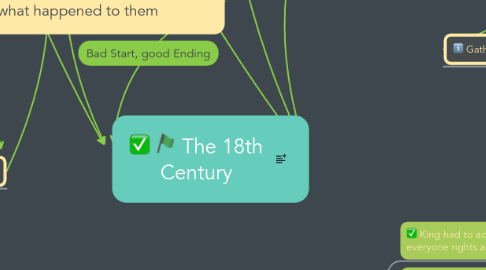
1. European Changes
1.1. Population Growth
1.1.1. Development of Farming
1.1.1.1. Few Epidemics
1.1.1.2. New techniques, tech, crop, more land and better food for livestock.
1.2. Craft Products
1.2.1. Guilds = All control + Tax
2. Science and Advances
2.1. Progress is key for society progress
2.2. New strucutres were build thanks to the advances
2.3. By steam experiments Iater Watt developed the Steam Machine triggering the Industrial Revolution
3. GB Colonies BEFORE
3.1. The colonists were unhappy cause the GB imposed monopolies and taxes (mostly tea)
3.2. Instead of doing something to compensate it, on top of that, the colonies didn't have parliamentary representation
4. England BEFORE
4.1. Authoritarian Monarchy with 2 parliaments, House of Lords/Commons (control tax/war)
4.2. Stuart dynasty wanted to rule without Parliament and executed/arrested opponents
5. Hispanic Reign BEFORE
5.1. Charles the damned died without heir
5.1.1. The fight start to get the Hispanic crown (Archduke Charles "Habsburg" vs. Philip V "Bourbon")
5.2. The Crown of Aragon, England, the Dutch Republic, Portugal and Austrian Empire were with Habsburg family (keep charters)
5.3. The Crown of Castile and France wanted Bourbons (absolutism and impose Castilian rules)
5.4. Charles inherits German Empire and loses interest
6. Advances/Ideas
7. War/Revolution/Absolutism/Unfair
8. Enlightnenment/Wealth/Going up from something
9. Domestic System
10. Factories
11. Enlightnened Despotism
11.1. Not giving liberalism but...
11.2. Rationalised Administartion
11.3. Education Reforms
12. All for the people, nothing by the people
13. Spread of knowledge was also key
13.1. Thinkers-Scientists exchange of ideas
13.2. Creation of universities and academies for science
13.3. Cafés and salons became widespread
13.4. Literacy improved by newspapers, books and writing beeing very popular
13.5. Science was prestigious and enlightened guys got special scientific cabinets
14. Encyclopédie
14.1. Best-seller with 20 volumes, 2 decades of work, 7M words, more than 20m articles, all to bring all the knowledge and share it also presenting critical Enlightenment ideas
15. Treaty of Utretch gave England (Menorca and Gibraltar), Savoy (Sicily) and Austrian Empire (Milan, Luxemburg, Flanders, Naples and Sardinia)
16. All the "Countries" and what happened to them
17. Ancient Régime
17.1. Manorial System
17.2. Estates of the Realm
17.3. Absolutism
18. The Enlightnenment
18.1. Religious tolerance (deism)
18.2. Freedom of thought
18.3. Optimistic view with fairness
18.4. Confidence in Progress
18.5. Set the basis of liberalism
18.6. New Ideas
19. Capital
19.1. Nobility lost power
19.2. Burgeosie wealthier
20. Triangular trade
20.1. EU (manufactured goods) to A.A.A.
20.2. Colonies (exploited raw/exotic products) to EU
20.3. Slaves from Africa to America (forced to work)
21. Enlightnenment Thinkers
21.1. Diderot
21.1.1. Co-creator and publisher of The Encyclopédie
21.2. D'Alembert
21.2.1. Co-creator of The Encyclopédie
21.3. Montesquieu
21.3.1. Division of Powers (No more 1 man monarchy)
21.4. Voltaire
21.4.1. Parliaments to represent people (limiting nobility and royalty power)
21.5. Rousseau
21.5.1. Social Contract
21.5.1.1. Defining popular sovereignty (democracy)
22. Gathered in cafés or meetings
23. All of them are helping eachother
24. Social ideas
24.1. No stratified society (Ancien Régime)
24.2. Merits shouldn't be inherited, they should be achieved
24.3. Everyone is created equally, and has inalienable rights
25. Economic Ideas
25.1. No Mercantilism (precious metals as wealth)
25.2. Yes Physiocracy (agriculture and productive work as wealth)
25.3. Economic Liberalism + Adam Smith (The Wealth of Nations)
26. Political Ideas
26.1. No Absolutism (Ancien Régime)
26.2. The basis of modern politics by thinkers!
27. USA AFTER
27.1. USA's Constitution had lots of Enlightnment stuff.
27.1.1. Social Contract (Constitution)
27.1.2. Fair Separation of powers (Citizens vote Congress President and Senate)
27.1.3. Republican Government with federal system and president with broad powers
27.2. Constitution was completed with the Bill of Rights
27.2.1. Tolerance and freedom of: religion speech and assembly
27.2.2. Right of trial by Jury
27.2.3. Anyone shouldn't be deprived of life or property without reason
28. GB AFTER
28.1. King had to accept Habeas Corpus (letter recognising everyone rights and non-arbitrary detention)
28.2. Protestant King William of Orange was chosen by the parliament and accepted the Bill of Rights
28.3. Scotland + England made GB, Parliament could make laws, judicial power apart from government but monarch retained executive and some of its powers. GB became a parliamentary monarchy (only rich votes)
29. Spain AFTER
29.1. Bad Start
29.1.1. Philip V abolished all existing charters, institutions and imposed Castilian law + The new 4 decrees "De Nueva Planta"
29.1.2. Absolutist Kingdom returns with unified territory, no parliament power and all power in monarch (Ancien Régime)
29.1.2.1. Selects his cabinet secretaries
29.1.2.2. Councils abolished except for Castile (Supreme Council)
29.1.2.3. Legislation controlled by the monarch
29.1.3. Successive decrees made unification happen, like Castilian language or no foreigners and you can trade
29.2. Enlightened Despotism
29.2.1. By the start, thinkers actually appeared in Spain and thought to change and advance technically but Burgeosie had no power, Church held back reform and the last chance was to cooperate with the crown so...
29.2.2. King Charles III
29.2.2.1. Altough absolutist, Charles recruited thinkers (Count, Aranda and Floridablanca) to take Enlightnenment Despotism to Spain.
29.2.2.1.1. Expansion of Education
29.2.2.1.2. Economic Societies of Friends of the Country
29.2.2.1.3. Madrid huge expansion (Capital, roads and monuments)
29.2.2.1.4. Take over the Church
29.2.2.1.5. Freedom princing of Wheat
29.2.2.1.6. Trade from Spain ports to USA
29.2.2.1.7. Limitation of Mesta farmer's privilegies
